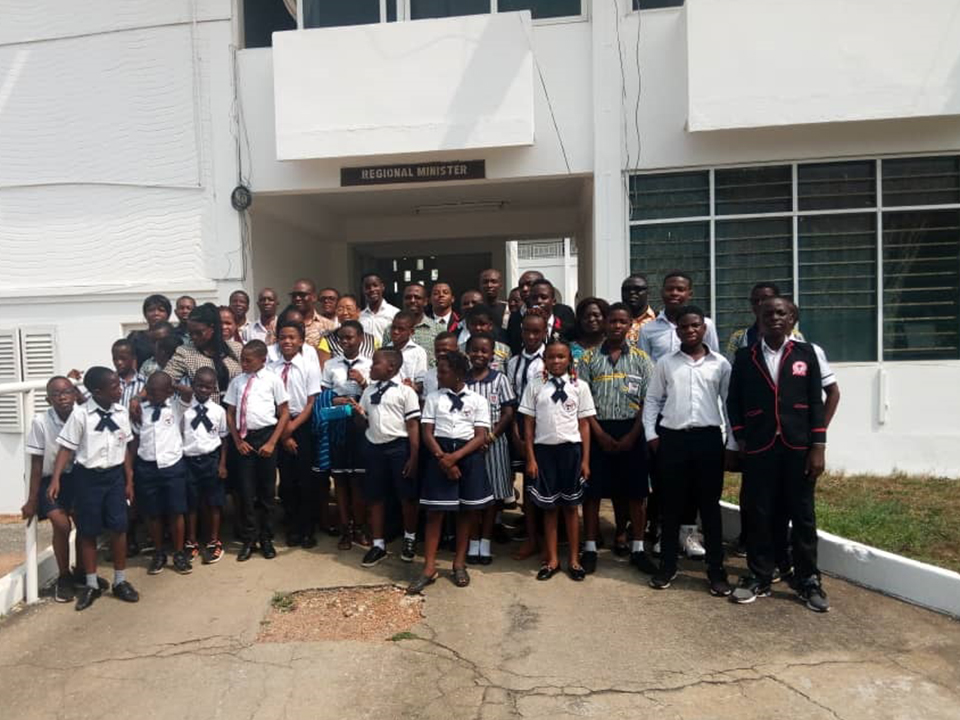The 4th International Conference for Postgraduate students has taken place at the University with a call on universities to innovate to avoid repeating the mistakes of previous educational programmes and strategies.
In a speech read on his behalf at the opening by the Provost of the College of Agriculture and Natural Sciences, Prof. L. K. Sam-Amoah, the Vice Chancellor, Prof. Joseph Ghartey Ampiah, said research was central to the work of a university since it reinforced teaching and learning and provided solutions to problems of society. To this end, the Vice-Chancellor indicated that the University continue to place great emphasis on research through the development and support for masters and doctoral research programmes.
Prof. Ampiah explained that the Directorate of Research, Innovation and Consultancy (DRIC) was established with the mandate to co-ordinate research, innovation and consultancy in the University. According to him, the future progress of Ghana and Africa depended on the contributions of the graduates that were currently produced.
“It means that to respond to the emerging socio-economic challenges and opportunities of the 21st century, the education we offer must be visionary and future-oriented”, he stressed.
He said in the current changing world, attending a research conference has become a ‘must’ to survive in an academic discipline geared to produce and share knowledge and solve societal problems.
In this light, the Vice-Chancellor noted that the University would continue to strengthen its research and conference funds to support students and faculty to attend such important conferences.
Delivering the keynote address, the Pro-Vice-Chancellor, Prof. George K. T. Oduro, said challenges facing nations globally have become complex. For that matter, he said nations were exploring ways of coping with climate change, diseases, conflicts, nuclear threats, over population, cyber fraud, social injustice, illiteracy, poverty, gender discrimination and corruption, adding “the situation in Sub-Saharan Africa, particularly, in Ghana is not different”.
The Pro-Vice-Chancellor intimated that, the continent’s ability to cope with such complex challenges depended largely on the extent to which postgraduate education offered by tertiary education institutions meet the demands and aspirations of a particular nation. In view of that, the Pro-Vice-Chancellor called on African universities to consider doing things differently in the area of postgraduate education.
“The complexities of developmental challenges facing the Sub-region in the 21st century, demands new ways of delivering postgraduate education”, he stated.
Prof. Oduro further said that the new wind blowing across the globe suggested clearly that “any university that runs postgraduate programmes that do not impact on industry cannot be said to be meeting the demands of the 21st Century University.” For that reason, he said most universities in the western world were strongly linking contents of postgraduate programmes and focus of postgraduate research to the needs of industry. “Postgraduate programmes are geared towards providing solutions to address particular needs of the society”, he said.
Prof. Oduro called for a paradigm shift to ensure that postgraduate studies impacted positively on industry. “Universities must move from the provision of one-discipline-indexed postgraduate programmes to inter-disciplinary programmes. Where possible, there should be an integrated approach to postgraduate studies because problems and challenges associated with the operations of industry or society in the 21st century requires multi-sectoral ideas and tools to address”.
The Pro-Vice-Chancellor also called for licensing and patenting of intellectual properties of postgraduate work. This he believed could serve as an income generating venture for both students and the universities.
Presenting a paper on the topic: Mobilising Resources for Postgraduate Work: Human, Monetary and Materials, a former Vice-Chancellor of the University of Education, Winneba, Prof. Jophus Anamuah-Mensah, noted that the status of postgraduate education in the developing world particularly Ghana was not encouraging.
“This is an area that receives the least attention in developing countries. Ghana spends only 0.3% of GDP on Research and Development (R&D) far less than the recommended 1% of GDP as agreed upon by the African Union”, he bemoaned.
Prof. Anamuah-Mensah revealed that a 2012 study of 28 EU countries showed that “an increase in R&D expenditure as a percentage of GDP by 1% would cause an increase of real GDP growth by 2.2%”. Explaining further, he said it meant that as countries invested more in R&D, that is in the creation and use of knowledge, their economies grew faster.
Unfortunately, he noted that “While developing countries based their economic growth largely on the creation and use of knowledge, developing countries depended mostly on raw natural material resources thereby leaving developing countries at the periphery of global knowledge production architecture”.
The theme for the conference was “Changing the Orientation of Postgraduate Education for the 21st Century”. The three-day conference was attended by lecturers, postgraduate students from various universities in the country and industry players.


